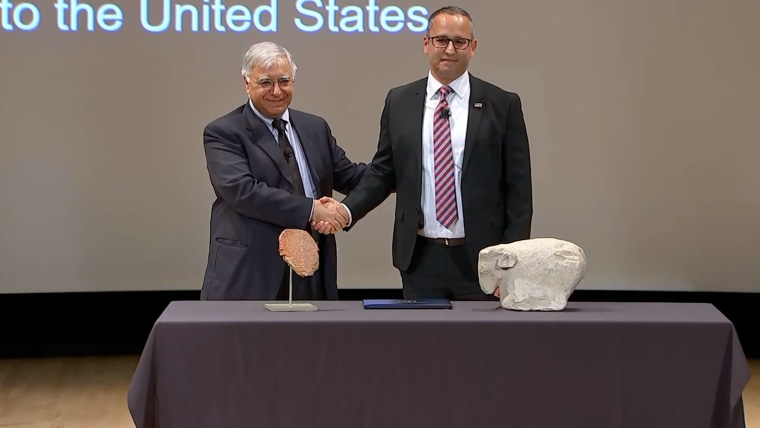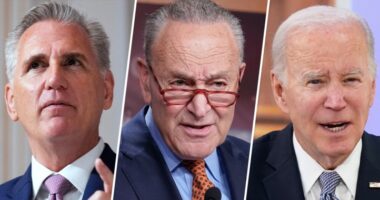A lot can change in a year.
Before Israel’s historic agreements with Arab countries beginning in August 2020, openly discussing the possibility of normalizing relations with the Jewish state would have been unthinkable in Iraq. But last week, speakers at a conference attended by hundreds in the country’s Kurdish region did just that.
“It is both necessary and inevitable, for the sake of regional peace, to recognize Israel as a friendly country,” Sahar al-Ta’i, a senior researcher at the Iraqi Ministry of Culture, Tourism and Antiquities, told participants. “We want peace with Israel.”
While this public call is unprecedented, the backlash indicates that Iraq is still far away from declaring peace with Israel. Instead of boosting the prospects of peace, the Sept. 24 conference may have played into the hands of hard-liners vehemently opposed to normalization.
The Iraqi government has condemned the conference and has issued arrest warrants for two of the main speakers and at least three other participants, including al-Ta’i, who has also been dismissed from her job at the culture ministry. The conference organizer said al-Ta’i had attended in a private capacity.
Under Iraqi law, it’s illegal to promote “Zionist principles.”
NBC News was unable to reach al-Ta’i for comment by phone.
Powerful groups backed by Iran also condemned the meeting in Erbil, the capital of Iraq’s autonomous Kurdish region. They called for those involved to be prosecuted.
“The Zionist killing entity will not have a place in the Iraq of prophets, saints, martyrs, and righteous people,” Fatah, a political bloc in the Iraqi parliament representing Tehran-backed Shiite militias and parties, said in a statement Sept. 25 referring to Israel.
According to Harith Hasan, a nonresident senior fellow at the Carnegie Middle East Center in Beirut, the conference has ended up being counterproductive to the cause of normalization.
“It mobilized Islamist parties, Iran-aligned parties that found in this a good pretext to appear as the ones who are genuinely representing the Iraqi public opinion and opposing Israel,” he said.
Iraq has been technically at war with Israel since the latter’s foundation, and has for decades been one of the Arab world’s most enthusiastic supporters of the Palestinian cause. Iraqi dictator Saddam Hussein shot Scud missiles at Israel during the 1991 Gulf War.
Now, even after the United Arab Emirates, Bahrain, Sudan and Morocco normalized ties with Israel, doing the same remains politically and socially taboo in Iraq.
Even if there was an appetite for normalization, Fanar Haddad, a former adviser on foreign relations to Iraqi Prime Minister Mustafa al-Kadhimi, said the country’s weak centralized power and Iranian influence meant recognition of Israel was not currently something that could be seriously considered.
“Iraq simply does not possess that centralized decision-making sovereign power that would be required for such a reorientation,” he said of the foreign policy.
Meanwhile, in a country where militias act largely with impunity, the blistering backlash to the conference may deter Iraqis who support normalizing ties with Israel from speaking out again anytime soon. At least two participants have since said they were misled about the meeting’s purpose and one apologized to Iraqis and the Palestinian people.
One of these was Sheikh Wisam al-Hardan, the leader of the Sons of Iraq Awakening Council, whose fighters joined U.S. troops in the war against Al Qaeda at the height of the Iraq War and later went on to fight the Islamic State terrorist group.
Al-Hardan’s name appeared on an op-ed in The Wall Street Journal last month calling for Iraq to establish full relations with Israel and he was among the speakers at the event in Erbil. But as backlash to the conference built, he said in a video message posted online Sept. 25that he thought the meeting was about peace and tolerance among Iraqi people, and had been surprised that normalization with Israel was mentioned in the statement he had read aloud at the event.
“I read the statement that was written for me without knowing its content,” he said. “I denounce the content of the final statement and what was stated in it.”
The next day, an arrest warrant was issued for al-Hardan. Then on Monday he lost his job as head of the Sons of Iraq Awakening Council. Al-Hardan could not be reached for comment.
Joseph Braude, president of The Center for Peace Communications, a New York-based group that promotes engagement between Israelis and their Arab neighbors and organized the Erbil conference, said al-Hardan had known what was in the speech.
Braude said al-Hardan had written the speech with his help, and that al-Hardan had signed off on the Journal article which was translated from Arabic into English by Braude.
Steve Severinghaus, senior communications director for the Journal, said the paper had worked through an intermediary and had been told that al-Hardan had signed off on the edited version.
Local journalists said that al-Ta’i and al-Hardan remain in Erbil where the Kurdish authorities have so far not arrested them. NBC News was unable to independently verify these reports. Kurdish authorities have in the past offered protection to Iraqi politicians who cross the central government, so it would not be the first time Erbil defied Baghdad’s orders.
Braude said his organization was doing everything it could to help participants who are now in danger.
Despite the backlash, he said the conference spoke to a much larger trend in Iraq and dismissed speculation that the peace initiative was being pushed from abroad.
Millions of Iraqis want “civil engagement and partnership with Israelis” but are prevented from saying this openly, he said.
Braude cited Iraqi engagement with the Israeli Ministry of Foreign Affairs’ Facebook page in the Iraqi dialect, interviews with Iraqis over several years and a poll by the Israeli Ministry of Foreign Affairs to back up claims for widespread support for normalizing relations.
Braude, who says his mother is an Iraqi Jew from Baghdad who fled in the early 1950s,founded The Center for Peace Communications. The organization was established in 2019 and receives most of its funding from private American philanthropists and none from the Middle East, he added. He did not disclose who his donors are, but said the center does not accept funding from governments.
A State Department official said that the U.S. government was not involved with the conference and learned about it after the fact. The Biden administration was supportive of efforts to deepen ties between Israel and countries in the region, the official added.
Iraq’s Jewish community traces its roots back to ancient Babylonia, and by 1910 roughly a quarter of Baghdad’s population was Jewish. They played an important role in the establishment of the modern Iraqi state, but Nazi-inspired riots in 1941 later killed Jews and helped drive out the population. In the early, 1950s, many fled to the newly established state of Israel.
There are no official statistics on how many Jews remain in Iraq today, but the Meir Taweig synagogue, the main synagogue in central Baghdad, is closed and few Iraqis openly identify as Jewish.
After America invaded Iraq in 2003, Iran emerged as a major power broker in that country, supporting Shiite Islamist parties and militias that have dominated it ever since.
Analysts said the conference would be used by Iran-aligned groups as proof that there are people inside Iraq pushing for normalization with Israel. Haddad said these groups have often used normalization as a political slur to discredit and delegitimize opponents.
“This now allows them to put some imaginary flesh on an imaginary bone,” he said.
But Braude was hopeful voices for peace would prevail.
“It’s not new for Tehran’s proxies to try to terrorize Iraqi dissenters into silence,” he said. “What is new is that people for the first time are coming together publicly to call for peace.”
Source: | This article originally belongs to Nbcnews.com











